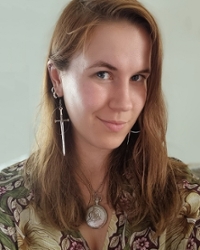This 13-week course centers on analyzing video games as cultural artifacts, focusing on two game series: ‘The Life is Strange Series’ by developer DON’T NOD and the ‘Assassin’s Creed Series’ by UbiSoft. You will delve deep into the gameplay experience of these games, while also examining their broader cultural and societal significance. This exploration will take place through in-class lectures, discussions, tutorials, practical sessions, as well as independent study involving readings on game studies and exploring game-related materials. Crucially, you’ll engage with these concepts by playing the two games, documenting your experiences, and analyzing both your own and others’ interactions with them.
Instructors:
Walter Crist III (he/him) is an archaeologist and postdoctoral researcher in the AI & machine learning group within LIACS.
Corine Gerritsen (she/her) is a PhD candidate at Leiden University within the project ’Playful Time Machines’. Here she is preoccupied with the mechanics of video games set in the past and analyzing how they make these Time Machines tick. Before, she obtained a BA degree in history and an MA in Master Ancient Studies. She finished a master-apprenticeship, focusing on Seleucid coinage, and she did an internship at VALUE Foundation, studying the past in video games. She continued in this field, writing her master thesis about antiquity in video games, specifically the representation of Rome’s enemies.


Keerthi Sridharan (they/them) is a PhD candidate in the Playful Time Machines project. Their research is centered around games and play as spaces that facilitate and complicate processes of identification, identity construction, and relationality. Previous work has examined emotional play in TTRPGs, perspective in player-character interaction, and language as a playful resource in conversational interaction. By examining individual experiences of video games through a multi-modal, interdisciplinary approach, they hope to gain insight into how personal and collective understandings of the past can be (re)shaped through play. They are a sociolinguist by trade, a gamer by choice, and curator of an ever-growing list of indie TTRPGs that they’ll get around to playing at some point. Their spare time is spent stress-baking, making music, and drafting Twine games.
Assessment
- Course Notebook 20%: Students will respond to a weekly prompt with either a Vignette (Weeks 1-7) or Field Notes (Weeks 8-13), to be uploaded to Brightspace and discussed in class. At the end of the course, students will compile these responses into a Course Notebook for submission.
- Game Review 40%: Students will write and submit a review of a chosen video game, demonstrating their knowledge of topics covered in the first part of the course.
- Research proposal 40%: Students will write and submit a research proposal outlining a hypothetical experiment using a chosen video game, reflecting on the research methods studied during the course.
Schedule
| Week 1: Autoethnography as a method | Class 1: Introduction Class 2: Ellis et al. (2011) ‘Autoethnography: An Overwiew’. |
| Week 2: Gaming Affect | Class 1: Vignette #1 Discussion Let’s Play Life is Strange Ep 1 Class 2: Isbister (2017). How Games Move Us: Emotion By Design (pp. 1-72) |
| Week 3: Empathy in Games | Class 1: Vignette #2 Discussion Let’s Play Life is Strange Ep 1 Class 2: Ruberg (2020). ‘Empathy and Its Alternatives: Deconstructing the Rhetoric of “Empathy” in Video Games’. |
| Week 4: How to Write a Game Review | Class 1: Vignette #3 Discussion Let’s Play Life is Strange Ep 2 Class 2: Nieborg & Foxman (2023). Mainstreaming and Game Journalism. |
| Week 5: Game Industry Practices | Class 1: Vignette #4 Discussion Let’s Play Life is Strange Ep 3 Class 2: Keogh (2023). The Video Game Industry Does Not Exist ch 7. From Videogame Field to Videogame Industries. |
| Week 6: Audience Construction | Class 1: Vignette #5 Discussion Let’s Play Life is Strange Ep 4 Class 2: Shaw (2013). ‘On Not Becoming Gamers: Moving Beyond the Constructed Audience’. |
| Week 7: Gaming Queerly | Class 1: Vignette #6 Discussion Let’s Play Life is Strange Ep 5 Class 2: ‘Drouin (2019). Games of archiving queerly: Artefact collection and defining queer romance in Gone Home and Life is Strange.’ |
| Week 8: Participant Observation | Class 1: Introduction to Game User Research & Field Notes Let’s Play AC: Origins Class 2: Sangin (2018). Observing the player experience in Drachen et al. Games User Research. |
| Week 9: Focus Groups | Class 1: Field Notes #1 Discussion Let’s Play AC: Origins Class 2: Poels et al (2007). “It is always a lot of fun!”: exploring dimensions of digital game experience using focus group methodology. |
| Week 10: Surveys & Questionnaires | Class 1: Field Notes #2 Discussion Let’s Play AC: Origins Class 2: Bruhlmann & Mekler (2018). Surveys in Games User Research. in Drachen et al. Games User Research. |
| Week 11: Annotation with Atlas.Ti | Class 1: Field Notes #3 Discussion Let’s Play AC: Origins Class 2: TBD |
| Week 12: Eye-Tracking | Class 1: Field Notes #4 Discussion Let’s Play AC: Origins Class 2: Sundstedt (2012). Eye Tracking in Video Games, in Sundstedt Gazing at Games: an introduction to eye tracking control. |
| Week 13: Wrapping up | Class 1: Wrap-Up Class 2: Walk-in |